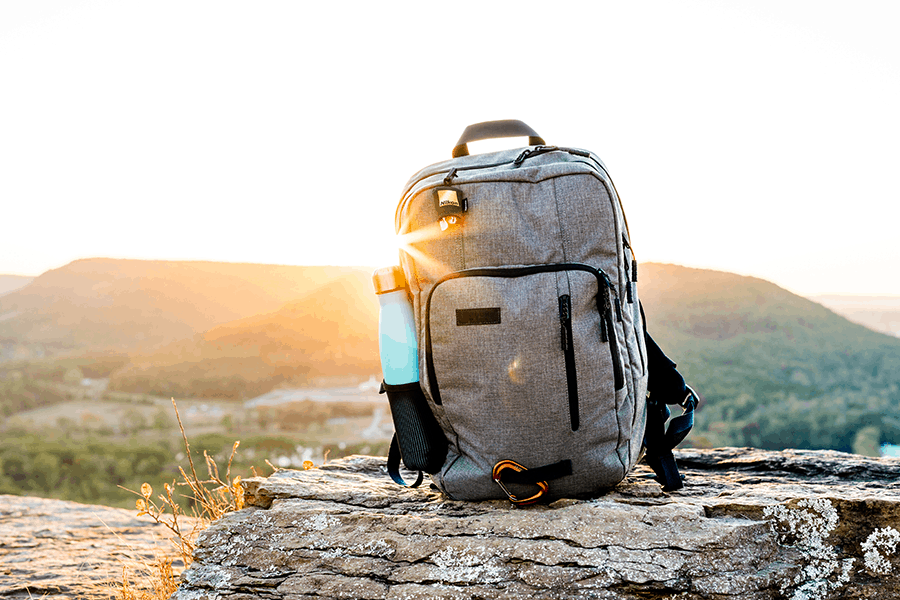
So you got yourself a new metal detector, or maybe you are eyeing one online and now is the time to start considering what else you may need. Perhaps you have been involved in the hobby for sometime and are looking for ideas to make your hunting trips easier. Maybe, this is your first search on the hobby and you are asking the question what do you need for metal detecting? We have compiled a list of 16 must have accessories for your metal detecting adventures.
Some of these accessories come in kits from online and local stores. Check out our recommended gear page to see our suggestions and favorites.
1. Waterproof Pinpointer
Pinpointers are a must have for all metal detector enthusiasts. It is often very difficult to find a target once it has been identified with a detector. Often times the metal object has been buried for sometime and has developed a patina matching its surroundings.
Pinpointers help zero in on a target and can very easily lead you to the exact location of the metal object. I have had items in my hand numerous times and could not see them until they had been located with the pinpointer.
Not all pinpointers are waterproof and I would highly suggest getting one that is. One never knows where their hunting adventure will take them and there are numerous times, locations, and situations where the potential of water soaked equipment exists. Our favorite is the Garrett Pro Pointer, you can find it here.
2. Headphones
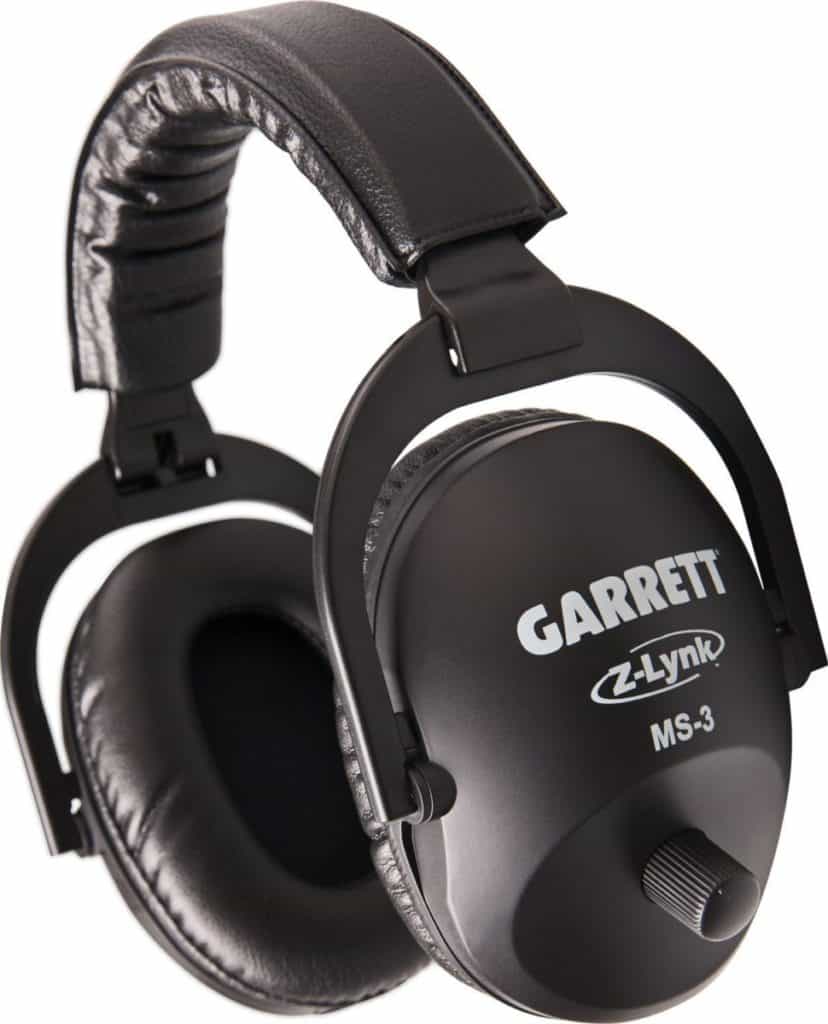
Another important accessory to have in your inventory is a good set of headphones. These headphones serve a variety of purposes that will help make your metal detecting adventures a success.
The first perk to having a good set of headphones is better, more accurate target acquisition. Headphones drown out any outside noise interference as you are listening to the nuances of your detector’s tones before determining if the target is worthy of the effort to dig it up.
Secondly, they are a respectful consideration to others who may be around. Others might be out relaxing or reading etc and the reoccurring tones of a metal detector could prove frustrating.
Sometimes metal detector enthusiasts do not want others around them knowing they found something or potentially what they found. Headphones help ensure that only you have an idea of what is buried in the ground.
Finally, they can help save battery life in your detector. Playing tones through headphones is far less draining than through a detectors external speakers.
There are both corded and cordless models available, some have concerns over the latency (response time) of cordless headphones, however investing in a good set (if you choose to go cordless) will result in negligible latency issues.
3. Carry Case
Transporting your detector from place to place is necessary for any detectorist. This movement can have the potential to damage your equipment. Therefore, it is a good idea to invest in a good carrying case.
Most cases on the market will be padded which is ideal for most situations. If one is planning on a long, or difficult trek with their metal detector, then hardshell cases are available and should be considered for this application. For most of us, the padded soft shell cases will be sufficient.
Also consider a carrying case for other accessories you might be bringing along. A duffle bag or backpack might do the trick depending on what equipment you are brining and the terrain you will be traversing to get to your hunting grounds. A dedicated bag for your accessories will also help ensure no necessary equipment is left in the car or at the house.
4. “Finds” Pouch
Once you find a treasure, whether it be gold or trash, you will need a place to put it. Many companies offer these pouches and they are often included in kits.
Many of these pouches have several compartments to help separate your finds into whatever categories you decide. Most if not all will have zippers to ensure your finds don’t fall out. These pouches typically fit around your waste for easy access.
Some adventurers have several pouches or pockets to help separate finds. Often people will use the pouch as a trash or junk collecting space, and then put their good finds in a shirt or pant pocket. Just ensure that these pockets have a closing mechanism, preferably a zipper.
5. Hand Shovel
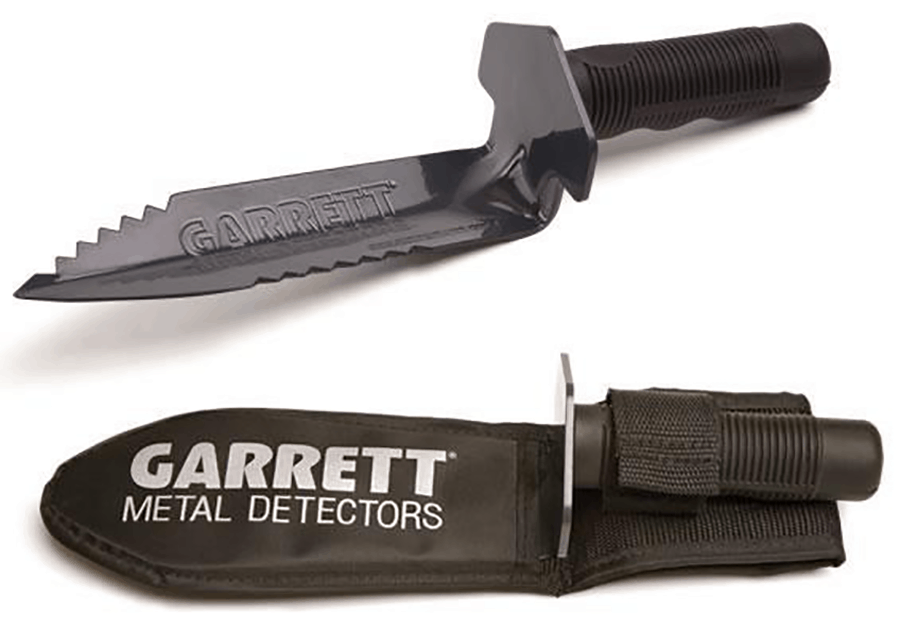
Having the right hand shovel can save you so much time and effort when digging selected targets. Often the ground is hard, dry, and full of roots making digging difficult at times.
When choosing a hand shovel look for one that has serrated edges. This will help cut through any material in the way as you dig your plug. Also look for a shovel with a padded handle to help ease wear and tear on your hands.
Some of these hand shovels have rulers on the side as well. This can be helpful when the depth of an object is known. Some metal detectors can approximate depth of a target before you begin digging.
6. Shovel
Sometimes a dig requires a little more oomph than a hand trowel. A good quality shovel fits the bill. There are a few things to consider when choosing the right shovel for your adventures.
Always choose a shovel with a pointed end. This helps penetrate the soil easily and helps cut through any roots that might be in the way. Also look for a shovel with a sturdy comfortable handle.
Weight is also a consideration when choosing a shovel. Many detecting adventures require walking over large distances. Carrying around a heavy shovel could cut your hunt short due to tiredness and/or soreness.
One important thing to remember when hunting with a longer shovel is that the end is most likely made out of metal. This could interfere with your detector while searching for actual targets. Always keep your shovel pointed upwards or set it down in a close but prominent spot until needed.
7. Gloves
A good pair of gloves is always recommended when going on a metal detecting hunt. Obviously this will protect your hands while digging and searching in the earth.
Look for a good glove that is puncture resistant. You will find a lot of rusty metal while searching, and a lot of it will be sharp. I don’t know about you, but Tetanus is not on my list of items I want to find while detecting. This features also helps with stickers and thorns you may encounter along the way.
Also consider getting some that are light weight and easy to put on and take off. You will not want to wear them the entire time you are out hunting, only when retrieving a target.
We typically use gloves designed for mechanics in our hunts. These gloves are often puncture resistant and still provide a great range of motion for finding items. They are easy to get on and off and are thin enough to fit easily into a pocket when not in use.
8. Sand Scoop
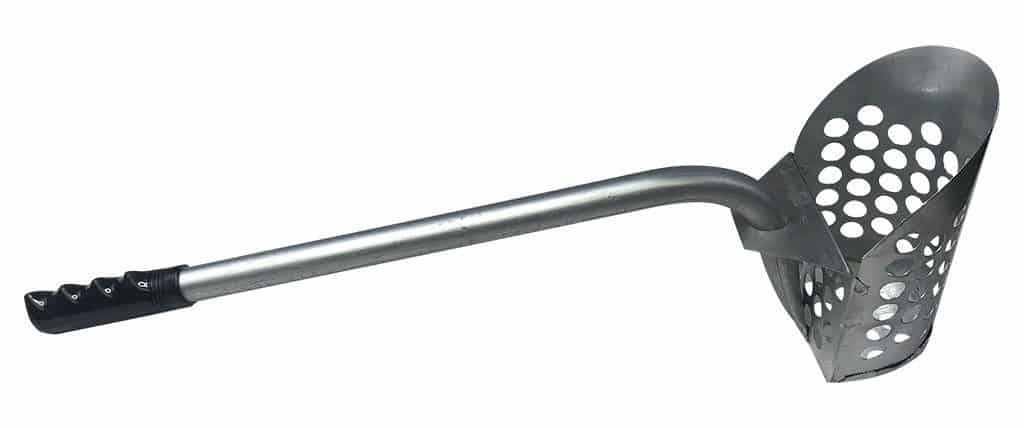
if your hunting adventures take you to a sandy location like the beach then this handy contraption will be well worth the money. These handy shovel type tools can save time, and energy and even prevent back pain.
This device is a small scoop on the end of a pole. This scoop has numerous holes in the sides. Once an object is located with the metal detector simply scoop up the sand where the signal was and shake. The sand falls our leaving the metal object in the scoop.
These can be both metal or plastic and can be handheld or mounted on a pole. The metal options will obviously be more durable and a pole mounted one will be more useful.
If you are going to use a metal one, remember to keep it as far away from the detector as possible to prevent false signals. These are mostly utilized in sandy locations and almost completely unuseful in other applications. If your adventure will not take you to a sandy dig site, leave this tool behind. If you will be visiting sand, it is a must have.
9. Extra Batteries
Nothing is more frustrating then embarking on an epic treasure hunting adventure and then having to quit due to dead batteries. This is especially true when the finds are great and plentiful. Always keep extra batteries in your metal detecting kit.
Some people recommended rechargeable batteries for their metal detectors and pinpointers. While it is true that these batteries will save you money over the long run, the benefit does not outweigh the cons in this situation. Rechargeable batteries are great and have improved drastically over the years, but they do still run out of charge. If this is all you have, then you will either have to find a power source and wait while your batteries recharge, or you will have to call it quits for the day. Both options are equally frustrating.
There is also the potential that your battery gets ruined or simply wears out in the middle of a hunt. Without backup batteries on hand, this scenario will end your day.
Also consider where you will store these batteries. A waterproof container or sealable plastic bag are great places to keep your spare batteries. Your adventures may lead you to some dirty, dusty, and/or wet locations and keeping these extra power sources away from the elements is a good practice.
10. Knee Pads
Knee pads is an accessory some like and use while others do not. We personally do not use them but see the value in having a pair in certain situations and individuals. So here is a brief “pros and cons” list for knee pads.
Often the ground you are working can be rocky or dirty and knee pads can help prevent discomfort when digging. They can also help prevent stickers, burrs, and thorns from poking your knees. Some knee pads have extra padding on the back to help support your body, which can be very beneficial to those with knee and/or back problems. Knee pads can also help keep clothing from being worn out or getting wet during your search.
Despite all these positive attributes, there are some negative aspects of knee pads. They are often clunky and heavy, making it difficult to walk from one target to the next. They can also get items such as small sticks, and rocks lodged between the pad and the skin, which can sometimes hurt more than the ground itself. Also consider the weird tan lines they may give you if you are out hunting in shorts.
11. Backpack
Being prepared for almost any situations requires a lot of gadgets and tools. Not every tool will be used on every trip, but it is a good idea to be prepared for any situation that may come up. A good backpack is essential for carrying these items.
Look for a backpack with padded straps. These tend to be a little more expensive but worth the money when it comes to comfort. Long hunts can become tiresome and a heavy backpack only adds to the fatigue, pads help prevent shoulder pain etc and thus help eliminate yet another problem.
Multiple pockets and pouches are also a plus when selecting a backpack. Organization can help quickly locate the required tool or gadget quickly and help prevent frustrations. To get the most usefulness out of a bag we carry one that has external pouches. We use these pouches to hold our mouse frequently used items, such as our pinpointer, and hand shovel.
Finally consider durability when choosing a backpack specifically for metal detecting. You will be exposed to natures elements and cheap backpacks wear out quickly. This results in the necessity to purchase another, which will actually end up costing you more money instead of saving some with a cheap bag.
12. Boots/Snake Guards
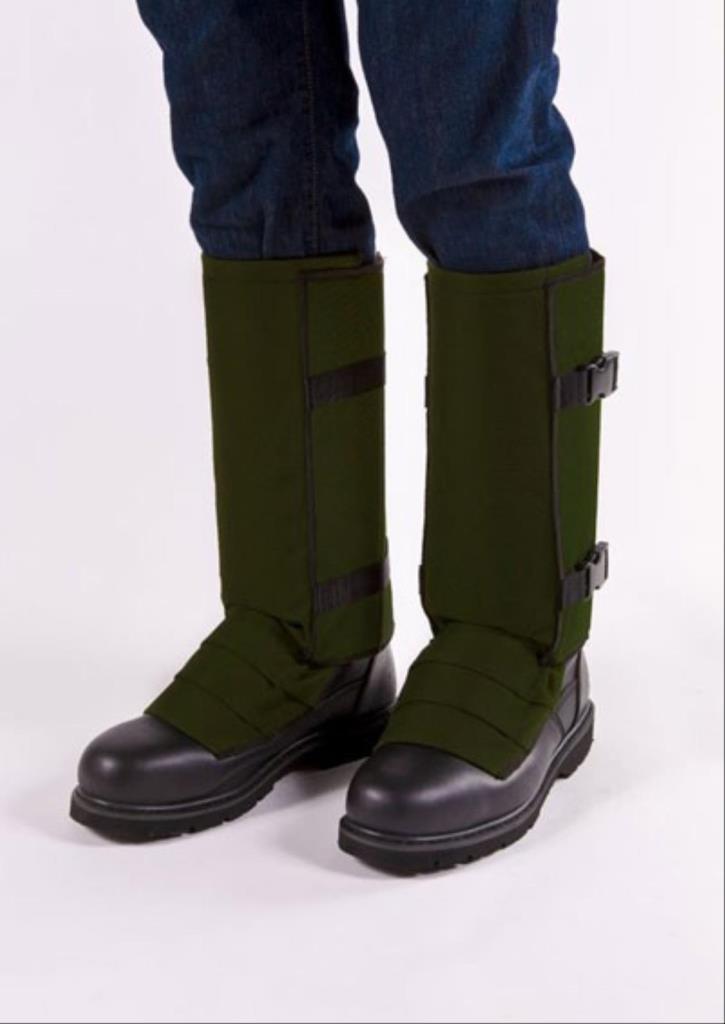
A good set of waterproof hiking boots is a very good idea when embarking on a metal detecting hunt. Although they are a little heavier than a pair of tennis shoes, the overall comfort is better with a good pair of boots.
When choosing a boot for metal detecting consider comfort as well as functionality. You may be hiking or walking a good distance so you will want to choose a pair that is designed for this purpose. Also consider getting some that are waterproof to prevent soggy socks etc.
If you are in an area that has the potential to house snakes, consider getting some snake boots or snake guards. These tend to be worn higher on the shin but the awkwardness is way better than getting bit. There are even guards for stingrays if you are detecting at the beach.
One thing to avoid is steel toed boots. At first it seems like a good idea to consider these for the added protection. However, steel is metal which can and will give you false signals.
13. Cutting Tool
Many times your metal detecting hunt will lead you to a field or river bed, but sometimes you might want to trek a little further into the woods. In this case a cutting tool may be necessary.
Small machetes are a good choice to bring along. Make sure your blade has a sheath to protect it and you when not in use. Also be sure that you have the right and/or permission to go chopping away at vegetation on land that you do not own.
We have a set of small gardening shears in our bag. These are helpful for cutting back small tree limbs and bushes to allow us to dig a little closer to these obstructions. Just be careful how you pack them in your backpack.
14. Magnifying Glass
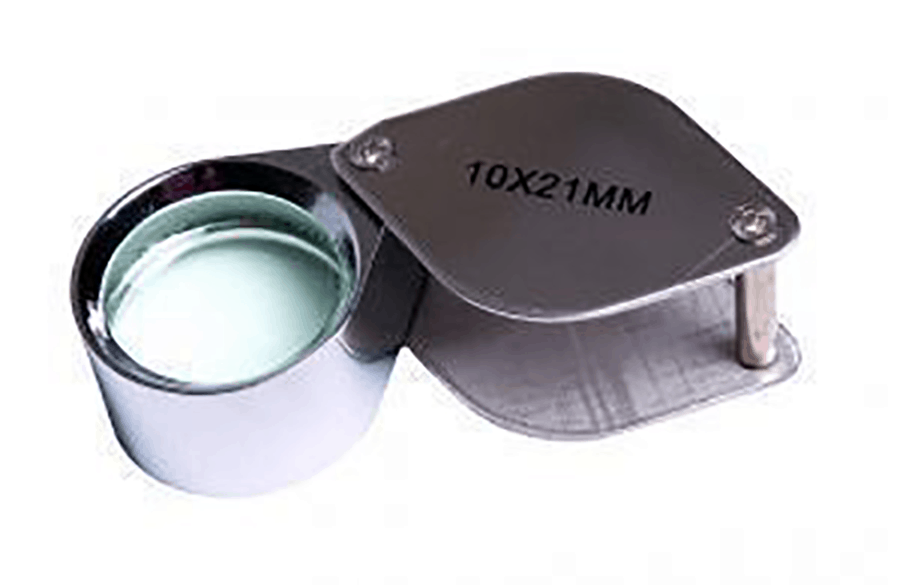
Detecting often produces finds that are very small and covered in soil and rust. Identifying these items can be difficult in the field. Carrying a magnifying glass in your kit is always a good idea.
There are other scenarios where a magnifier of some type would prove beneficial. When finding old coins, for example, the first thing most people want to know is the date on the coin. Sometimes it is easy to make out, others need magnification.
A small magnifying glass is very inexpensive and can help identify objects. However these tend to be bulky and awkward and take up a lot of room in your bag. There are many alternatives to the traditional magnifying glass available such as loupes. These tools are just as inexpensive and have a much smaller profile in your bag.
15. Flashlight
A lot of people forget to carry a flashlight with them on their metal detecting hunts. It does not seem necessary as most hunts take place in the bright sunlight. However, there are a few great reasons to be sure you have a flashlight in you bag.
Some hunts, especially when they are very successful, last until sundown. Having a flashlight on hand will make it easier to return to your starting location once it gets dark.
You may also encounter small caves, old water wells, or even abandoned buildings while hunting. These locations are obviously naturally dark and having a flashlight will help you explore these very interesting places.
We carry an LED flashlight with extra batteries in our pack. Small flashlights will do the job, but you can purchase a high powered LED light for just a few bucks more. This is worth the extra money in my opinion. Also consider a headlamp, as this will free up your hands as you explore or trek back to your vehicle.
16. Toothbrush
As stated numerous times already, most of your finds will be crusted with dirt and/or rust as they come out of the ground. Having a way to clean your finds enough to identify them is a good idea.
You will want a soft bristled brush in your pack. You don’t want to damage the item with course or wire bristles. In most cases you will be okay to pour a little water on the find and brush it lightly with the toothbrush. If you are nervous or in doubt, you could always wait and have it cleaned by someone who knows how.
Any dollar store, soft bristled, toothbrush will work. We do not use anything other than that in field cleaning, never use a wire brush on a find.
Other Items
There are a few other items you will want to bring with you on your adventure.
- Bottled Water – For drinking, cool down on hot days, and cleaning.
- Bug Spray – For those pesky mosquitos and ticks.
- Sunscreen – Necessity and SPF vary by complexion.
- Walkie Talkie – To communicate to your team when cellphone service dies.
Good luck on your hunting adventure and remember to always get permission before you begin. There are also inherent dangers with any outdoor activity, thus participate at your own risk.
Have fun and stay safe!
Backpack Photo by Josiah Weiss on Unsplash
